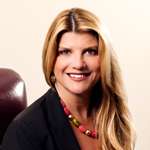The first way I define success at TiVo is ensuring that nothing bad happens to the company from a legal or regulatory perspective that we have the ability to control. This is the risk management key performance indicator (KPI). The second type of KPI is helping the company get business deals done quickly and efficiently, including coming up with creative solutions to legal and business issues. A third measure is being proactive, strategic, and preserving or opening new areas for the company to compete.
When hiring, I look for intelligence, flexibility, and a willingness to learn new things. Nothing here is static. Personality fit is also critical, because we are a relatively small team and we all need to support and work together without egos getting in the way.
At TiVo, we’ve been an integral part of the transition from “appointment-based viewing” to allowing people to consume content when they want, and more recently, where they want. We were the first DVR company to allow transfers between DVRs and from a DVR to a computer and mobile devices.
When I started at TiVo, we were a start-up, and I spent a lot of time on product issues and making sure we didn’t get sued out of existence. Currently, I’ve been spending a considerable amount of time on some legislative matters as well as strategy. It really varies day by day on what the company is specifically working on, but I try to apply myself to areas where I can add the most value to the company.
I don’t have a ton of time to watch television, but when I do, I record and watch The Daily Show and The Colbert Report pretty religiously. Netflix is integrated into our products, and I’m working my way through the second season of House of Cards.
To my younger colleagues: you will spend a large portion of your working life thinking about work issues, so find an industry or practice area that aligns well with your interests. Working in an area that interests you will be more enjoyable, and you will likely be more successful and satisfied with your work.
After my first year of law school in Washington, DC, it was hard to get a summer legal job, and I ended up working for a friend’s house painting company in Burlington, Vermont, where I went to college.
Painting gives you a lot of time to think, and I decided I wanted to combine my interest in broadcasting with my interest with law. I went back to DC and got an internship with National Public Radio, and later at the FCC. Those experiences gave me a leg up on getting a job at a law firm with a communications practice, which is a highly specialized and competitive field that is located predominately in DC.

